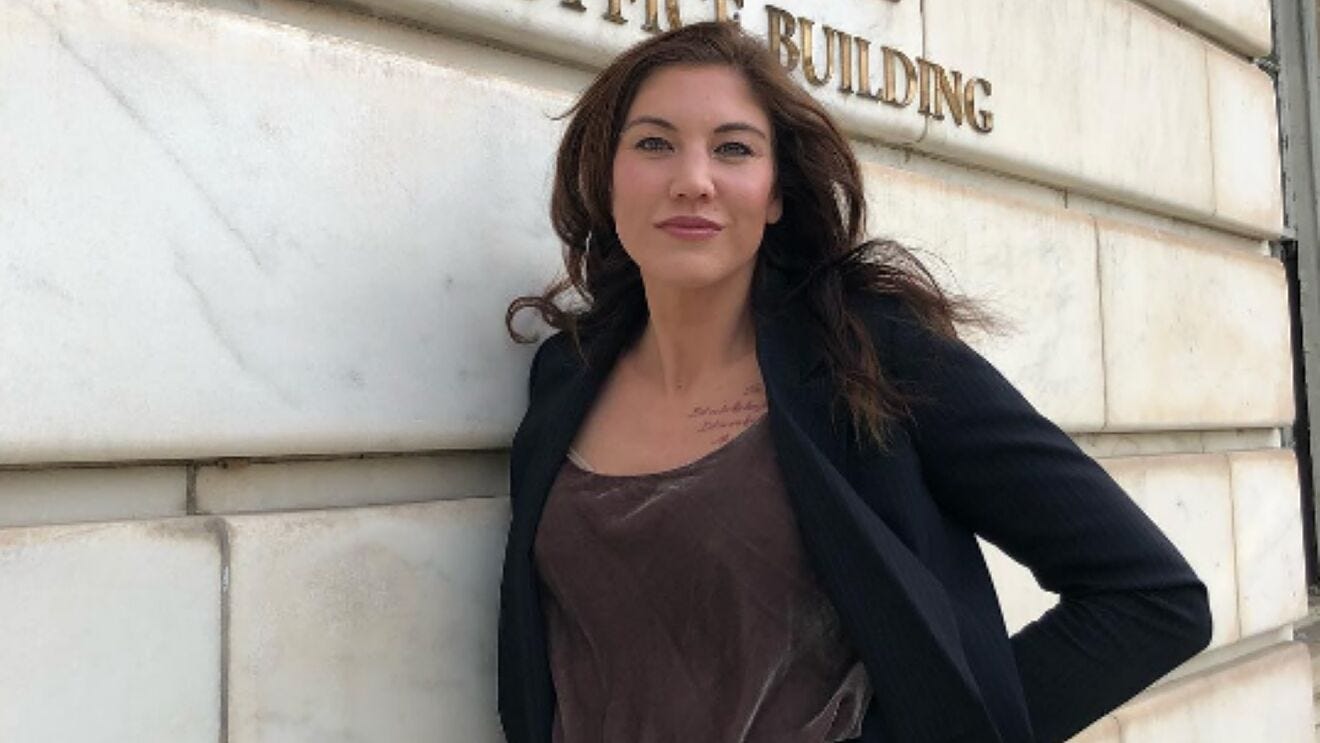'Ouch' Moments and Takeaway Lessons
The hurt we often put on ourselves and developing strength of self awareness
Dan Price (pictured) has experienced a self-inflicted, precipitous, painful fall from media support and public adoration.
The now former chief executive of Gravity Payments became known to the masses for “cutting his own salary to $70,000 to ensure all of his employees would all make at least $70,000, has stepped down as CEO after multiple allegations of assault,” Observer reporter Rachel Millman has reported.
Once a sensation on Twitter for his tweets about doing the ethical, unselfish, compassionate thing in business, Price is now a target of contempt. Reputation can change quickly. It's always fluid.
Play dirty with people behind the scenes of your well-crafted public persona and you can expect a fall from grace. Don't assume a current zenith is one you’ll always be enjoying.
Credit to Hope Solo, a goalkeeper for the United States women's national soccer team from 2000 to 2016, a World Cup champion and two-time Olympic gold medalist, for the following comment in response to her own reputation suffering after a DUI arrest, which reportedly included passing out behind the wheel of a vehicle, with her two-year-old twins with her:
“I didn’t think I needed help. And I certainly wasn’t going to ask for it.
“At the time, I didn’t know that I was only doing a disservice to my family. I thought that I could white-knuckle it. But the reality is that nobody gets to live without asking for help.
“My sense of strength and pride became my two worst enemies.”
Strong, successful people, especially prideful ones, don’t like to think they need help or don’t want to ask. It’s difficult to bring oneself to the realization that it’s needed and not shameful, even if it is felt as embarrassment or fear.
Yet Solo touches on something valuable. “I didn’t know that I was only doing a disservice to my family.”
We do unnecessary harm to other people as well as ourselves when we “pass” on seeking assistance. We are more comfortable being relied on for our expertise than relying on others for theirs, to help us. It’s natural yet short sighted and high risk.
Solo also spoke the depths of the consequences, something people don’t often consider as risk factors with errors of communication or other behavior.
“I've disappointed my husband, my friends and family and it has caused arguments between Jeremy and me. I feel never-ending guilt, shame and embarrassment. I was mother-shamed around the world,” she said.
“My income now will not go directly to my family, which is another layer of guilt that I must work to shed. I can't drive for an entire year which is a massive inconvenience to my family and is a loss of independence.”
Solo later spent 30 days in rehab.
“The burden fell on Jeremy and he had recently had a full knee replacement and was struggling to walk, let alone chase the kids up and down the hill into the chicken coop and everywhere else,” she said.
Now, not every reputation crisis involves a DUI yet every crisis affects far more of a person’s life and those around them, than what might be suspected.
Ooooh that smell
Can't you smell that smell
Ooooh that smell
Lynyrd Skynyrd
I noticed a headline that captured my attention, and I'll tell you why in a moment....”Your Reputation Precedes You and Follows You.”
Precedes. And follows.
A useful analogy can be that reputation is similar to a smell. When our reputation is healthy and admirable, the smell is wonderful and appealing on us. When our reputation is poor or rotten, it smells awful and people react accordingly to it as they would any off-putting or repulsive odor.
Now, back to the headline....”Your reputation precedes you and follows you.”
This means the desirable smell of a good or strong reputation is greeted with openness from people before you even arrive, while you’re in someone’s presence and follows you when you leave. Excellent news, right?
Yet the opposite is true too. The stench of a shaky or rotten reputation arrives before you do, sticks to you as you interact with other people and follows you around, like an unwanted companion, when you depart.
Another headline: “We don’t want that to be our reputation”
There are certain ways we don’t want people perceiving and judging us and it can become mostly, or the only way we are thought about.
The question is are we doing all we can in a legal, moral way to avoid being thought of in a manner that we find unwanted? Sometimes yes, sometimes no.
Of course we can’t decide for others how they view and judge yet we can often influence it by how we think, what we decide, what we do and don’t do and how it all aligns with societal or personal expectations.
And if this is confusing — and it can be at times — there is always consulting or coaching guidance to steer you through the difficulty.

Brad Pitt continues to have scandalous articles about him reported and circulating. His reputation will never be the same, similar to Johnny Depp, with some fans, media and the general public. This type of behavior tends to become a new skin to wear.
This is why intelligent, respectful, skilled conflict resolution behind the scenes is so critical to accomplish. That this type of family trauma happened to Jolie and the children is terrible; that it became public is not doing anyone any favors.
Pitt and Angelina Jolie are going at each other with Pitt angry at Jolie for business and family disputes. It’s a war. Pitt is not responding well to it behind the scenes or publicly and it’s disappointing. Is he the only one contributing to the family misery and his reputation adversity? Maybe not yet in the public eye, that is the judgment.
Will Smith has a greater possibility of overcoming his self-inflicted crisis of reputation after the assault of Chris Rock on stage, than Pitt and Depp.
Sports analogy time. I hope that’s ok.
Don’t be “offsides” with people.
In sports, it’s a violation and penalty. In life, it’s the same thing. It just isn’t communicated always by those who are upset with us.
Other people don’t like it when we commit unwanted acts, with words or behavior, against them and they respond in ways that we may not like (we get penalized).
Now this doesn’t mean that every “offsides” is factual and legitimate. It could very well be perceived and without reason, we get hurt.
I’m also not suggesting to conduct ourselves fearfully. I do recommend thinking about how we interact with people in words and actions, not only for better interactions but also to protect against harm.
Final headline
I don’t want to focus on the person as much as I do, the quick lesson.
First, the headline: Can Will Smith's reputation ever recover?
Of course. Yes. Absolutely.
The quick lesson? Most anyone can overcome a badly mangled reputation. Not everyone but most everyone, as an individual or an organization. That’s factual.
The challenge is being willing to be honest with ourselves about what happened, how we contributed to it, own that responsibility and then being willing to do everything that is necessary to walk through the fire and out of it.
So many people, for various emotional reasons, don’t want to do what the situation calls for and therefore, don’t.
This decision making often seems like a question of logic yet you might be surprised to learn that it’s much more a question of emotions, clear vision, management of emotions and moving forward with flexibility and commitment.
So, regarding Will Smith and most people, the answer to the question, “Can a reputation be ‘recovered?’” Yes. Absolutely.
Michael Toebe is the creator of Reputation Notes and founder and reputation specialist at Reputation Quality, a practice that serves and helps successful individuals and organizations in further building reputation as an asset and when necessary, ethically and successfully protecting, restoring and reconstructing it.
NOTE: if you would like to be interviewed for the newsletter and can talk about important, interesting and insightful matters of reputation, you can contact me at Michael.Toebe@Reputation-Quality.com.








